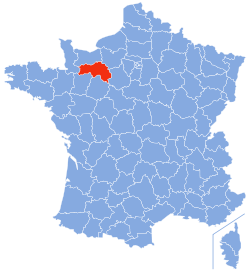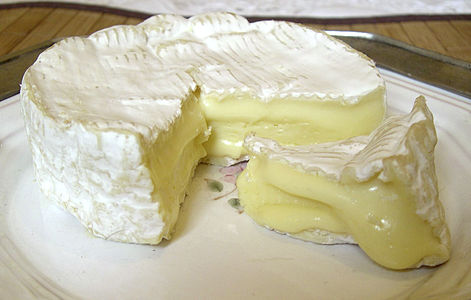|
Orne
Orne (French pronunciation: [ɔʁn] ⓘ; Norman: Ôrne or Orne) is a département in the northwest of France, named after the river Orne. It had a population of 279,942 in 2019.[3] HistoryOrne is one of the original 83 départements created during the French Revolution, on 4 March 1790. It was created from parts of the former provinces of Normandy and Perche. It is the birthplace of Charlotte Corday, Girondist and the assassin of Jean-Paul Marat. GeographyOrne is in the region of Normandy neighbouring Eure, Eure-et-Loir, Sarthe, Manche, Mayenne, and Calvados. It is the only department of Normandy not to border the English Channel. EconomyThe largest town by a considerable margin is the prefecture, Alençon, which is an administrative and commercial centre for what is still an overwhelmingly rural department. There are no large industrial centres, and agriculture remains the economic focus. Demographics
The inhabitants of the department are called Ornais. The recorded population level peaked at 443,688 in 1836. Declining farm incomes and the lure of better prospects in the overseas empire led to a sustained reduction in population levels in many rural departments. By the time of the 1936 census, the recorded population stood at just 269,331. Once motor car ownership started to surge in the 1960s, employment opportunities became less restricted and by 1982, the population level had recovered a little to 295,000, after which it slowly decreased. Principal townsThe most populous commune is Alençon, the prefecture. As of 2019, there are 5 communes with more than 5,000 inhabitants:[3]
PoliticsThe president of the Departmental Council is Christophe de Balorre, elected in 2017. Presidential elections 2nd round
Current National Assembly Representatives
CultureAlençon is the chief town of the Orne department. Camembert, the village where Camembert cheese is made, is located in Orne. The local dialect is known as Augeron. TourismSee also
References
External links
|
||||||||||||||||||||||||||||||||||||||||||||||||||||||||||||||||||||||||||||||||||||||||||||||||||||||||||||||||||||||||||||||||||||||||||||||||||||||||||||||||||||||||||||||||||||||||||||||||||||||||||||||||||||||||||||












